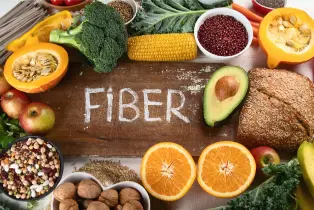Happy Thanksgiving!
As we gather for Thanksgiving, let’s cherish family, friends, and good food. But remember, digestive health matters too!
Quality Time Together
Thanksgiving is about family, laughter, and bonding. Create lasting memories and strengthen bonds.
Digestive Well-Being
Enjoy your feast without discomfort. Tips for a healthy Thanksgiving meal:
1. Portion control: Savor each bite and avoid overeating.
2. Mindful choices: Choose lean turkey, veggies, and cranberry sauce.
3. Post-feast comfort: Take a walk, stay hydrated, and eat mindfully.
Managing Holiday Stress
Stress affects digestion. Practice deep breathing and mindfulness to maintain well-being.
Healthy Holiday Travel
Traveling during the holidays? Keep your digestion in check:
1. Stay hydrated: Carry a reusable bottle and limit caffeine/alcohol.
2. Smart food choices: Pack snacks and choose healthy options at rest stops.
3. Manage stress: Plan ahead, practice relaxation, and stay organized.
Enjoy the holidays with gratitude, health, and happiness!
Thanksgiving Recipe That Supports Digestion

Honey-Cinnamon Roasted Sweet Potatoes: A Sweet Twist on Tradition
Sweet potatoes are a delightful treat that can be enjoyed during Thanksgiving as a side dish or even as a dessert due to their natural sweetness. While the classic marshmallowtopped buttery yams are undeniably delicious, they can be overly sugary and potentially cause digestive discomfort. However, sweet potatoes themselves are rich in fiber and beneficial for your digestive health.
Here’s a recipe for Roasted Sweet Potatoes with Honey and Cinnamon, offering a lighter yet equally delightful twist on the traditional favorite:
Ingredients:
- 4 medium-sized sweet potatoes, peeled and cubed
- 2 tablespoons olive oil
- 2 tablespoons honey
- 1 teaspoon ground cinnamon
- 1/2 teaspoon salt
- Freshly ground black pepper, to taste
Instructions:
- Preheat your oven to 400°F (200°C) and line a baking sheet with parchment paper or lightly grease it.
- In a large bowl, combine the cubed sweet potatoes, olive oil, honey, ground cinnamon, salt, and a dash of freshly ground black pepper. Toss everything together to ensure the sweet potatoes are evenly coated.
- Spread the seasoned sweet potato cubes in a single layer on the prepared baking sheet, ensuring they are not crowded. This will help them roast evenly.
- Roast the sweet potatoes in the preheated oven for approximately 25-30 minutes or until they are tender and have a golden-brown caramelized exterior. Be sure to toss them halfway through the roasting time to ensure even cooking.
- Once the sweet potatoes are done roasting, remove them from the oven and let them cool slightly before serving.
- Serve your Roasted Sweet Potatoes with Honey and Cinnamon as a delightful side dish that balances the natural sweetness of sweet potatoes with the warmth of cinnamon and a hint of honey. Enjoy!
This recipe offers a healthier alternative to the traditional candied yams, highlighting the natural goodness of sweet potatoes while providing a delicious, satisfying dish for your Thanksgiving table.
Taking Control of Your Health: The Importance of Colon Cancer Screening

While Colon Cancer screening might not be the most glamorous subject, it’s undoubtedly one of the most crucial discussions you can have when it comes to your health.
Understanding Colon Cancer
First, let’s get on the same page about what we’re dealing with here. Colon cancer, or colorectal cancer, ranks as the second leading cause of cancer-related deaths in the United States. This isn’t a disease that plays favorites; it can affect both men and women, and its risk tends to rise with age. But the good news is that colon cancer is often preventable and highly treatable when detected early.
Why Screening Matters
One of the unique challenges with colon cancer is that it can develop from precancerous growths called polyps, which often lurk silently in your colon for years without any noticeable symptoms. This is where regular screening comes into play. Screening tests are designed to identify these polyps or cancer in their infancy, making them easier to treat or even prevent from progressing into cancer.
When to Start Screening
The age at which you should kick-start your colon cancer screening journey depends on your risk factors and family history. As a general guideline, individuals at average risk should begin screening at age 45. However, those with a family history of colon cancer or other risk factors may need to start earlier.
How Does Screening Work
A colonoscopy is a medical procedure used to examine the inside of the colon and rectum. Here’s a brief overview:
1. Preparation: You’ll need to follow a special diet and take laxatives to cleanse your colon before the procedure.
2. Procedure: During the colonoscopy, a flexible tube with a camera at the tip (colonoscope) is inserted into your rectum. It’s used to inspect your colon’s lining for abnormalities, such as polyps or signs of cancer.
3. Treatment: If any polyps are found, they can often be removed during the procedure, and tissue samples may be taken for biopsy.
4. Recovery: Afterward, you’ll recover from sedation, and the doctor will discuss the findings and any necessary follow-up.
5. Discharge: You can usually go home the same day, but you’ll need someone to drive you due to the sedation.
Colonoscopies are crucial for detecting and preventing colorectal cancer, so follow your doctor’s screening recommendations based on your age and risk factors.
Taking Action
Your digestive health is a vital component of your overall well-being. We strongly encourage you to bring up the topic of colon cancer screening during your next visit. Together, we can determine the most suitable screening strategy tailored to your unique circumstances.
Remember, early detection is your greatest ally in the fight against colon cancer. By proactively addressing colon cancer screening, you’re making a significant investment in your long-term health.
Should you have any questions or concerns about colon cancer screening or any other digestive health matters, don’t hesitate to reach out to us. Your health is our utmost priority, and we’re here to guide you through this essential aspect of maintaining your well-being.
Stay well and take control of your digestive health!
Are You Getting Enough Fiber?

Maintaining a healthy digestive system is essential for overall well-being. One dietary component that plays a crucial role in digestive health is dietary fiber.
The Importance of Dietary Fiber in Digestive Health
1. Promotes Regular Bowel Movements: Dietary fiber adds bulk to stool, making it easier to pass through the digestive tract, preventing constipation.
2. Supports a Healthy Gut Microbiome: Fiber serves as food for beneficial gut bacteria, promoting a balanced and healthy gut microbiome.
3. Regulates Blood Sugar Levels: Fiber slows sugar absorption, helping manage blood sugar levels, especially in those with diabetes.
4. Reduces the Risk of Colorectal Cancer: A high-fiber diet may reduce the risk of colorectal cancer by keeping the colon clean and protecting against harmful substances.
Fiber-Rich Foods and Their Benefits
1. Whole Grains: Foods like oats, brown rice, and whole wheat bread support regular bowel movements and provide sustained energy.
2. Fruits: Apples, berries, and oranges offer fiber along with vitamins and antioxidants for overall health.
3. Vegetables: Broccoli, spinach, and carrots contribute to a healthy gut and digestive system.
4. Legumes: Beans, lentils, and chickpeas are high in fiber and protein, promoting gut health.
5. Nuts and Seeds: Almonds, chia seeds, and flaxseeds are fiber-rich snacks for added nutrition.
Incorporating Fiber into Your Diet
To benefit from dietary fiber:
1. Start your day with high-fiber cereals or oatmeal.
2. Snack on fruits, vegetables, or nuts.
3. Use whole grains in your cooking and baking.
4. Include legumes in soups, stews, and salads.
5. Stay hydrated when increasing fiber intake to prevent bloating.
Dietary fiber plays a vital role in maintaining a healthy digestive system. Including fiber-rich foods in your diet promotes regular bowel movements, supports a balanced gut microbiome, and reduces the risk of digestive issues. Make fiber a part of your daily nutrition to keep your digestive system in top shape and enhance your overall well-being.

